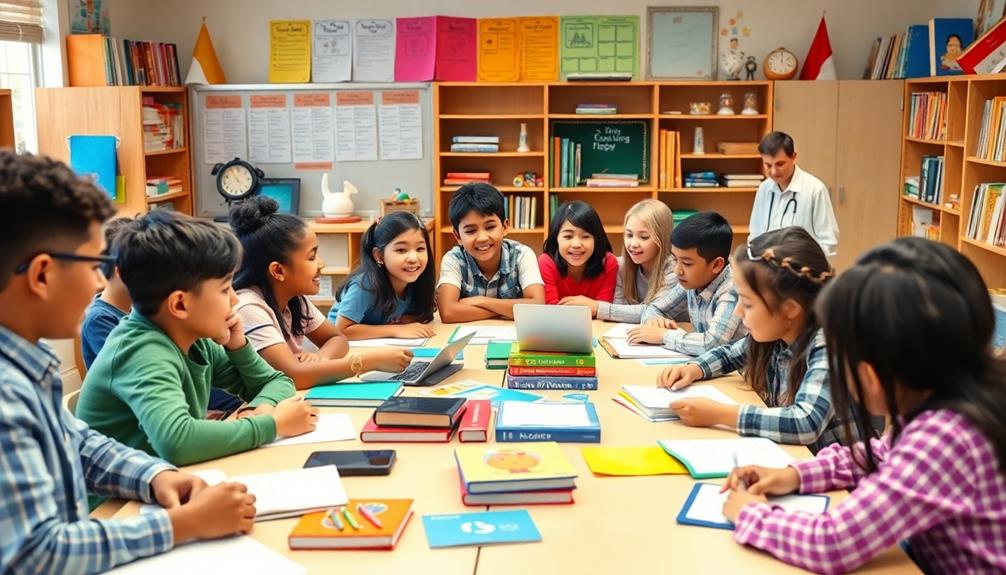Curious conversations spark new ideas by inviting diverse perspectives and encouraging genuine inquiry. When you approach dialogue with humility, you acknowledge that your beliefs can change, which opens the door to richer exchanges. Using open-ended questions stimulates exploration and demonstrates curiosity about others' viewpoints. Active listening plays an essential role, allowing you to validate feelings and encourage deeper discussions. This kind of respectful dialogue fosters trust and collaboration, especially in contentious areas like politics. Engaging in these practices can transform your conversations, leading to unexpected insights. There's so much more to discover about enhancing your dialogue skills.
Key Takeaways
- Humility in dialogue encourages openness, allowing participants to explore new ideas without the fear of being challenged.
- Open-ended questions stimulate curiosity, fostering exploration and diverse perspectives that lead to innovative thinking.
- Active listening validates participants' contributions, creating a safe space for exchanging ideas and enhancing creative collaboration.
- Framing opinions as flexible invites richer discussions, promoting a culture where new concepts can emerge organically.
- Engaging in respectful dialogue nurtures trust, enabling participants to share unique experiences that inspire fresh ideas and solutions.
Importance of Humility in Dialogue

In the domain of dialogue, humility acts as a powerful catalyst for meaningful exchanges. When you acknowledge your personal fallibility, you create space for open dialogue. This approach allows you to engage with differing viewpoints without the pressure of being right. Embracing uncertainty and admitting "I don't know" can ignite curiosity and lead to richer conversations.
Just as individuals maneuvering relationships with challenges like BPD's emotional instability may find humility essential in understanding differing perspectives, so too can anyone benefit from this mindset in dialogue.
By valuing truth over personal beliefs, you prioritize genuine inquiry, which fosters a deeper understanding among participants. This humility encourages you to ask questions and explore ideas rather than simply defending your stance.
You'll find that a willingness to listen and learn is vital for bridging divides in opinions and discovering common ground.
Courage plays a significant role here; when you engage with others, you might fear being swayed. Yet, this fear can hinder productive conversations and the opportunity for growth through diverse perspectives.
Instead, lean into that discomfort. By approaching dialogue with humility, you open the door to transformative exchanges that enrich your understanding and foster meaningful connections.
This mindset not only enhances your conversations but also deepens your relationships with others.
Strategies to Foster Curiosity

Curious about how to spark deeper conversations? To foster curiosity, start with open-ended questions like, "What do you think about…?" This approach encourages exploration of diverse perspectives.
When you frame your opinions as changeable, saying things like, "Here's where my head is at right now," you invite a more inviting dialogue. This signals your natural curiosity and helps others feel heard.
Value truth in your discussions; be transparent about your thoughts while remaining open to new ideas. Follow-up questions are essential, as they show you're engaged and truly interested in the other person's viewpoint. These questions can guide the conversation into deeper waters.
If tensions arise, don't hesitate to take a break. Resetting the conversation can refresh the dialogue and create a more collaborative environment.
Remember, curious individuals excel in social settings, leading to richer discussions and meaningful connections. By incorporating these strategies, you can create an atmosphere where curiosity thrives, and everyone feels comfortable sharing their insights.
After all, the best conversations stimulate not just dialogue, but also growth and understanding.
The Art of Active Listening

Mastering active listening can transform your conversations and deepen your connections. When you engage in active listening, you focus on fully comprehending the speaker's message, paying attention to nonverbal cues, and providing feedback. This not only shows empathy but also fosters an environment of open communication.
Reflective listening, where you paraphrase or summarize what's been said, confirms your understanding and validates the speaker's feelings, creating a stronger bond. Furthermore, just as effective communication is essential in parenting, it can also be beneficial in addressing sensitive topics, such as discussing options for trusted parasite treatment.
By practicing follow-up questions, you demonstrate genuine interest in the conversation, encouraging deeper exploration of the topic. This curiosity not only enriches your dialogue but also enhances the overall quality of your interactions. Studies reveal that attentive listening builds respect and empathy, which are important for nurturing interpersonal relationships.
When you actively listen, you create a safe space for others to express themselves, promoting reciprocal understanding. This practice allows you to connect on a more profound level, making your conversations more meaningful and impactful.
Curiosity in Political Discourse

Engaging in political discourse with a sense of curiosity can greatly enhance the quality of conversations. When you approach discussions with an open mind, you invite diverse perspectives that foster coexistence among differing viewpoints. By emphasizing curiosity, you shift from polarized debates to meaningful dialogue that respects multiple opinions.
Consider the following table that illustrates how curiosity can shape your political conversations:
| Curiosity | Impact on Conversations | Techniques |
|---|---|---|
| Engaging Questions | Encourages exploration of views | Open-ended questions |
| Active Listening | Builds understanding and trust | Reflective responses |
| Mutual Respect | Fosters collaboration | Acknowledging experiences |
Educational Resources for Engagement

Numerous educational resources are available to help you enhance your engagement in political discussions. For instance, online courses focusing on effective bridge-building habits and active listening can greatly improve your conversational skills.
Developing your cultural intelligence can also be essential in understanding diverse perspectives in discussions. Mónica Guzmán, a prominent figure in fostering meaningful conversations, offers insights through her work with Braver Angels and her Live Interview Series at Crosscut. Her approach emphasizes the importance of storytelling, encouraging others to share their perspectives and fostering a sense of connection.
You can also explore community resources like the Bridging Differences Quiz, which helps you assess your openness to diverse opinions. This tool encourages you to embrace curiosity and enhances your engagement in discussions.
Additionally, courses designed for parents and educators teach strategies for talking with kids about politics, ensuring the next generation develops these vital skills.
Participating in workshops and seminars focused on the science of happiness at work can create a culture of curiosity and collaboration in your professional environment.
Frequently Asked Questions
How Can I Initiate a Curious Conversation With Someone New?
To initiate a curious conversation with someone new, start by asking open-ended questions that invite exploration.
Instead of yes-or-no questions, try "What's your favorite travel destination and why?" or "What hobby are you passionate about?"
Share a bit about yourself too, to create a comfortable atmosphere.
Listen actively and show genuine interest in their responses, which encourages deeper dialogue.
What Are the Benefits of Curiosity in Personal Relationships?
Curiosity in personal relationships opens doors to deeper connections.
When you ask questions and show genuine interest, you create a space for vulnerability and trust. It helps you understand your partner's thoughts and feelings better, fostering empathy.
Curiosity also encourages growth, as you both explore new ideas and experiences together. Plus, it keeps the relationship dynamic and engaging, preventing stagnation.
Embracing curiosity can truly enrich your bonds and lead to more fulfilling interactions.
Can Curiosity Lead to Conflict in Discussions?
Yes, curiosity can lead to conflict in discussions. When you ask probing questions, some people might feel challenged or defensive, especially if they perceive your curiosity as criticism.
It's important to approach sensitive topics with care. You might uncover differing opinions, which can spark disagreements.
However, if you frame your questions thoughtfully and listen actively, you can turn potential conflict into a deeper understanding, transforming curiosity into a bridge rather than a barrier.
How Do Cultural Differences Affect Curious Conversations?
Cultural differences can greatly impact your curious conversations. When you engage with someone from a different background, their values and communication styles may not align with yours.
You might misunderstand intentions or emotions, leading to confusion or conflict. To navigate this, you'll need to be open-minded and actively listen.
What Role Does Body Language Play in Fostering Curiosity?
Body language's like an unspoken melody; it sets the rhythm of your conversations.
When you lean in, maintain eye contact, or nod, you're signaling your curiosity and engagement. These non-verbal cues encourage others to open up, fostering a deeper connection.
If you smile and use open gestures, you invite curiosity to dance, making it easier for both of you to explore new ideas and perspectives.
Conclusion
As you wrap up your journey through the power of dialogue, consider this: What if the next conversation you have could ignite a groundbreaking idea? Embracing humility and curiosity might just lead you down an unexpected path. Remember, active listening isn't just a skill—it's a doorway to understanding and innovation. So, are you ready to step through that doorway? The world of ideas is waiting, and the only thing missing is your voice. What will you discover?








